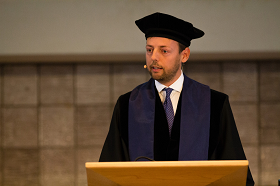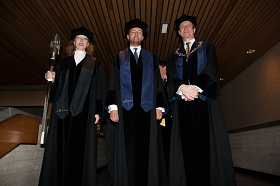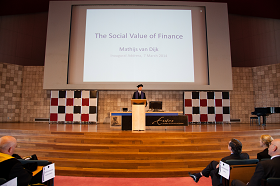Inaugural Address: The Social Value of Finance
On Friday 7 March 2014, <link people mathijs-van-dijk>Mathijs van Dijk, Professor of Finance, presented his inaugural address entitled ‘The Social Value of Finance’. Preceding the address there was a symposium, also on the topic of the social value of finance.
About the Inaugural Address
 In this address, Van Dijk considers “The Social Value of Finance” from two perspectives. First, he reflects on the value for society of finance as an academic field. The recent global financial crisis has undermined the reputation of the field of finance, with the inability to foresee the crisis as one of the most prominent criticisms voiced by the media and the general public. Mathijs argues that this criticism is by and large unwarranted, primarily because the financial system has grown to be so complex that it is virtually impossible to predict the occurrence (let alone the timing and extent) of severe financial crises. However, he does believe that there are other reasons for concern about the academic field of finance: "As a field, we do not get the balance right in what questions to focus on. Also, we sometimes lose ourselves in largely academic debates." One likely explanation, according to Van Dijk is the “physics envy” that many economists seem to suffer from and that has led the Finance profession to seek refuge in sophisticated mathematics and statistics. This development has resulted in a focus on narrow questions that can be answered quite precisely, instead of broad questions that are much harder to answer. The social value of finance as an academic field could be greater if it was more focused on broader questions, more open minded about other fields and methodologies, and more modest about the extent of its knowledge.
In this address, Van Dijk considers “The Social Value of Finance” from two perspectives. First, he reflects on the value for society of finance as an academic field. The recent global financial crisis has undermined the reputation of the field of finance, with the inability to foresee the crisis as one of the most prominent criticisms voiced by the media and the general public. Mathijs argues that this criticism is by and large unwarranted, primarily because the financial system has grown to be so complex that it is virtually impossible to predict the occurrence (let alone the timing and extent) of severe financial crises. However, he does believe that there are other reasons for concern about the academic field of finance: "As a field, we do not get the balance right in what questions to focus on. Also, we sometimes lose ourselves in largely academic debates." One likely explanation, according to Van Dijk is the “physics envy” that many economists seem to suffer from and that has led the Finance profession to seek refuge in sophisticated mathematics and statistics. This development has resulted in a focus on narrow questions that can be answered quite precisely, instead of broad questions that are much harder to answer. The social value of finance as an academic field could be greater if it was more focused on broader questions, more open minded about other fields and methodologies, and more modest about the extent of its knowledge.
 Second, to follow up on these aspirations, Mathijs presents a new research agenda on the value for society of finance in the sense of a financial system (that is, the social value of banks and financial markets). Although the belief that financial systems fulfill an important role in society is widespread, there is surprisingly little evidence on whether and how financial systems in different countries actually fulfill their social functions. The first project in this research agenda shows that the costs to society when finance goes wrong can be large. Using data on 187 banking crises in 126 countries, Van Dijk finds a significant decline in average life expectancy, birth rates, and primary school enrollment, and a significant increase in poverty and adolescent fertility in the six years after the start of a banking crisis. These effects mainly stem from less-developed countries. In the second project, he propose a cross-country empirical analysis on the extent to which financial systems fulfill two of their key social functions: capital allocation (that is, channeling capital in the economy to its most productive use) and consumption smoothing (that is, allowing households to cope with income shocks). In the third project, Van Dijk will examine the development and contribution to society of a considerable number of newly established stock markets (or “nascent markets”) over the past 25 years.
Second, to follow up on these aspirations, Mathijs presents a new research agenda on the value for society of finance in the sense of a financial system (that is, the social value of banks and financial markets). Although the belief that financial systems fulfill an important role in society is widespread, there is surprisingly little evidence on whether and how financial systems in different countries actually fulfill their social functions. The first project in this research agenda shows that the costs to society when finance goes wrong can be large. Using data on 187 banking crises in 126 countries, Van Dijk finds a significant decline in average life expectancy, birth rates, and primary school enrollment, and a significant increase in poverty and adolescent fertility in the six years after the start of a banking crisis. These effects mainly stem from less-developed countries. In the second project, he propose a cross-country empirical analysis on the extent to which financial systems fulfill two of their key social functions: capital allocation (that is, channeling capital in the economy to its most productive use) and consumption smoothing (that is, allowing households to cope with income shocks). In the third project, Van Dijk will examine the development and contribution to society of a considerable number of newly established stock markets (or “nascent markets”) over the past 25 years.
About Mathijs van Dijk
 Mathijs A. van Dijk is professor of finance at Erasmus Researhc Institute of Management, Erasmus University (ERIM). His research focus is international finance and investments. He has published in leading academic journals such as the Journal of Financial Economics, the Journal of Accounting and Economics, and the Review of Finance. In 2008, he received a 600,000 euro Vidi-grant from the Netherlands Organisation for Scientific Research (NWO) for a five-year research program on 'liquidity black holes.' Professor van Dijk has presented his work extensively at international conferences and seminars at academic institutions including, among others, Boston College, Dartmouth, Duke, Harvard, HEC Paris, INSEAD, and UCLA. He is also a frequent speaker at industry events and has written for practitioner-oriented journals such as the Financial Analysts Journal. Professor van Dijk has been a visiting graduate student at Warwick Business School and Princeton University and a visiting research scholar at the Ohio State University, Duke University, and UCLA. He obtained his MSc in Econometrics (cum laude) from Erasmus University and his PhD in Finance from Maastricht University.
Mathijs A. van Dijk is professor of finance at Erasmus Researhc Institute of Management, Erasmus University (ERIM). His research focus is international finance and investments. He has published in leading academic journals such as the Journal of Financial Economics, the Journal of Accounting and Economics, and the Review of Finance. In 2008, he received a 600,000 euro Vidi-grant from the Netherlands Organisation for Scientific Research (NWO) for a five-year research program on 'liquidity black holes.' Professor van Dijk has presented his work extensively at international conferences and seminars at academic institutions including, among others, Boston College, Dartmouth, Duke, Harvard, HEC Paris, INSEAD, and UCLA. He is also a frequent speaker at industry events and has written for practitioner-oriented journals such as the Financial Analysts Journal. Professor van Dijk has been a visiting graduate student at Warwick Business School and Princeton University and a visiting research scholar at the Ohio State University, Duke University, and UCLA. He obtained his MSc in Econometrics (cum laude) from Erasmus University and his PhD in Finance from Maastricht University.


